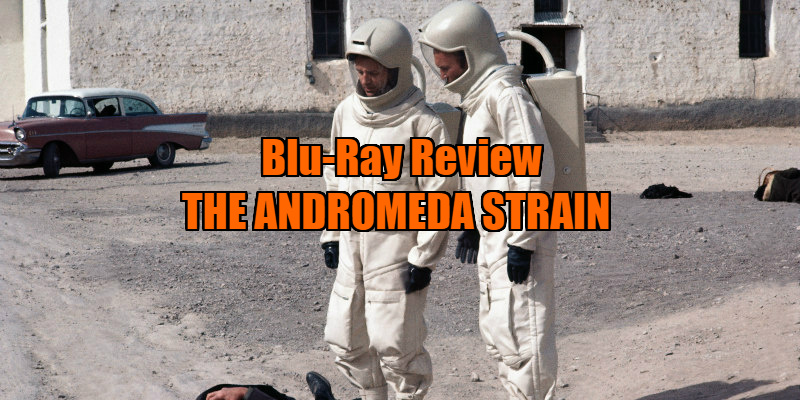
Review by Eric Hillis
Directed by: Robert Wise
Starring: James Olson, Arthur Hill, David Wayne, Kate Reid, Paula Kelly

The existential threat of a viral outbreak has fuelled several thrillers over the past couple of decades, from 1995's Outbreak to 2011's Contagion, with a slew of 'rage-virus' zombie movies bulking up the numbers. Since the fall of communism, the threat of nuclear destruction has been largely replaced in the collective consciousness by that of a terrorist group releasing a biological weapon into the atmosphere. Cold war cinema was naturally dominated by fear of the bomb, with only a handful of movies mining suspense from the idea of viral contamination. Films like 1950's Panic in the Streets and 1965's The Satan Bug explored this notion, but none as successfully as Robert Wise's 1971 thriller The Andromeda Strain, which has lost none of its power to instill dread in the viewer over the subsequent decades.
Adapted from Michael Crichton's 1969 novel (at a time when Hollywood could turn a story from page to screen at a lightning pace), The Andromeda Strain sees a team of scientists assembled for a top secret operation which the US government wants kept under wraps. A satellite has crash landed in a small New Mexico village, unleashing an alien virus which has killed all life in the town. All life, that is, save for a six month old baby and an elderly alcoholic, both of which are transferred to a secret underground facility where the scientists must figure out what connects these two survivors in order to develop an antidote. There's also the small matter of ensuring the virus doesn't escape the facility's subterranean level, at which point an automatic self destruct sequence will kick in.

Where most doomsday scenario movies divide their time between scientists, the military, the government and perhaps some average Joes caught up in the threat, The Andromeda Strain confines the vast bulk of its narrative to its central team of boffins. It's a tactic that could easily backfire if viewers find themselves alienated by the scientific shop talk and struggling for more relatable figures to hang their hopes and fears on. In order for this scenario to work, the film needs to convince us that we're watching highly intelligent professionals go about their business - nothing takes us out of sci-fi movies as much as unconvincing techno babble. It also needs to humanise its scientists, otherwise we may as well be watching robots at work.
Thanks to Wise's direction, screenwriter Nelson Gidding's adaptation of Crichton's text and a talented central cast devoid of household names, The Andromeda Strain nails the above criteria. As the quartet of eggheads charged with saving all our hides, Arthur Hill, James Olson, Kate Reid and David Wayne convince us of their characters' abilities while investing these intellectual protagonists with a necessary degree of humanity. Much suspense comes from the idea that their own government is willing to sacrifice them if they can't get the job done within a limited time frame. The offscreen presence of a president with a mistrust of science gives the film a now timely resonance.

Wise and Gidding avoid the clichés you might find in modern variations of this sort of story. There are no phone calls to crying wives, no scene where a city (usually in a part of the world that doesn't affect Americans) is destroyed to hammer home the potential threat to the US, no rekindled romance between divorced scientists. Instead we're left to watch highly educated people put their heads together in order to come up with a solution to a problem. It's thoroughly gripping.
The Andromeda Strain is an enthralling product of a more intellectual era, a time before Hollywood began appealing to the lowest common denominator, making no concessions to commercial appeal. There are no chiselled jaw-lines or high cheekbones in the central cast, whose homely looks only add to the verisimilitude. Everyone here looks like they've spent too much of their life working through the night, save for the pretty singer turned actress Paula Kelly, whose lab assistant is the closest the film comes to giving us an audience surrogate.

Wise is a director who rarely gets his due, probably because he spread his talents across a variety of genres, making him difficult to pigeonhole as an auteur. But he's one of the best filmmakers to ever grace mainstream American cinema, and his talent is fully on display here. The drama may take place in a handful of sterile rooms, but Wise, cinematographer Richard H. Kline and production designer Boris Leven ensure that it plays out in a visually engrossing environment. Each layer of the underground facility is colour-coded, a clever way of building tension as the scientists work their way down to the bottom layer where the fate of mankind awaits them. Working without the aid of CG, FX guru Douglas Trumbull does a spectacular job of replicating computerised diagrams and macro-photography.
I'm no scientist, so I can't comment on the accuracy of the technical procedures carried out in the film, but Wise and crew were in heavy consultation with the boffins of the day, and they certainly have me convinced. But don't take my word for it - the Infectious Diseases Society of America called The Andromeda Strain the "most significant, scientifically accurate and prototypic of all films of this genre."

Extras:
Commentary by critic Bryan Reesman; an appreciation by critic Kim Newman; 30 minute archive making of featurette; archive interview with Michael Crichton; trailer; TV and radio spots; galleries of stills, behind the scenes images and shooting script extracts; PDF of the 192-page “cinescript” with diagrams and production designs; collector’s booklet featuring new writing on the film by Peter Tonguette and archive publicity materials.

The Andromeda Strain is on blu-ray June 3rd from Arrow Video.
New Trailer & Poster For APOCALYPSE NOW: FINAL CUThttps://t.co/fHhxapI0pC#ApocalypseNow pic.twitter.com/QWPFRzEz1V— 𝕋𝕙𝕖𝕄𝕠𝕧𝕚𝕖𝕎𝕒𝕗𝕗𝕝𝕖𝕣.𝕔𝕠𝕞 🎬 (@themoviewaffler) May 24, 2019
